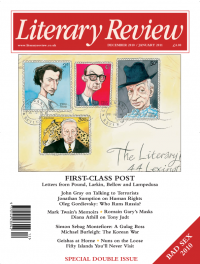John Gray
The Privilege of Absurdity
Talking to the Enemy: Violent Extremism, Sacred Values, and What It Means to Be Human
By Scott Atran
Allen Lane/The Penguin Press 558pp £20
In Leviathan Hobbes writes of ‘the privilege of absurdity; to which no living creature is subject, but man only’. Nothing could be more absurd, according to Hobbes’s way of thinking, than killing oneself – except perhaps killing oneself in order to kill others. War shows the law of self-preservation working itself out in practice: humans kill other humans because they fear being killed themselves. But if that is so then any type of warfare that involves certain death for the combatants will be self-defeating. Soldiers who sacrifice their lives in order to protect their comrades are committing suicide – an attitude that Hobbes, for whom a self-interested fear of death was the primary human motivation, could never account for. Behaviour of this kind is not only irrational, but – Hobbes at times suggested – a symptom of madness.
Though he is commonly seen as a grimly realistic thinker, Hobbes’s account of human conflict is a long way from the reality of violence. For all his insight into how humans are impelled to prey upon one another he would have been horrified by the world portrayed in

Sign Up to our newsletter
Receive free articles, highlights from the archive, news, details of prizes, and much more.@Lit_Review
Follow Literary Review on Twitter
Twitter Feed
‘The Second World War was won in Oxford. Discuss.’
@RankinNick gives the question his best shot.
Nicholas Rankin - We Shall Fight in the Buttery
Nicholas Rankin: We Shall Fight in the Buttery - Oxford’s War 1939–1945 by Ashley Jackson
literaryreview.co.uk
For the first time, all of Sylvia Plath’s surviving prose, a massive body of stories, articles, reviews and letters, has been gathered together in a single volume.
@FionaRSampson sifts it for evidence of how the young Sylvia became Sylvia Plath.
Fiona Sampson - Changed in a Minute
Fiona Sampson: Changed in a Minute - The Collected Prose of Sylvia Plath by Peter K Steinberg (ed)
literaryreview.co.uk
The ruling class has lost its sprezzatura.
On porky rolodexes and the persistence of elite reproduction, for the @Lit_Review: